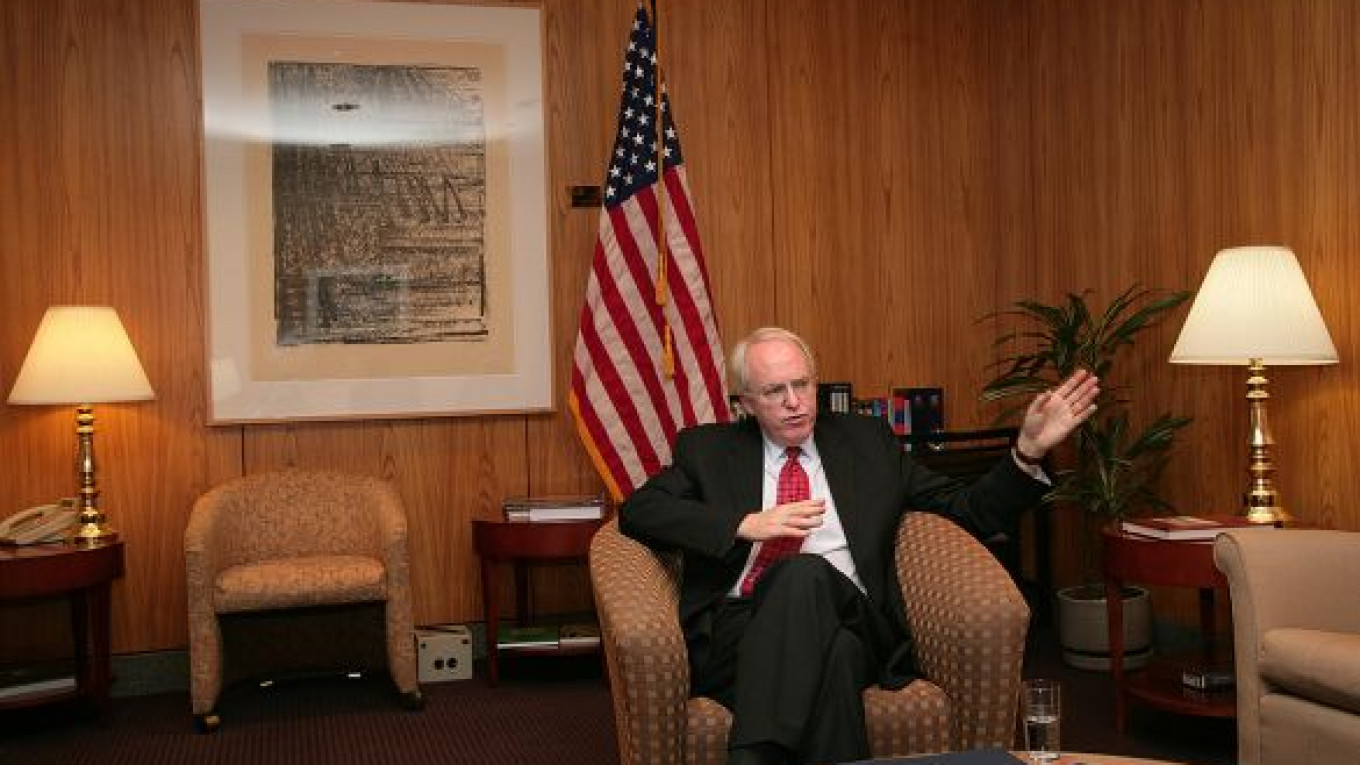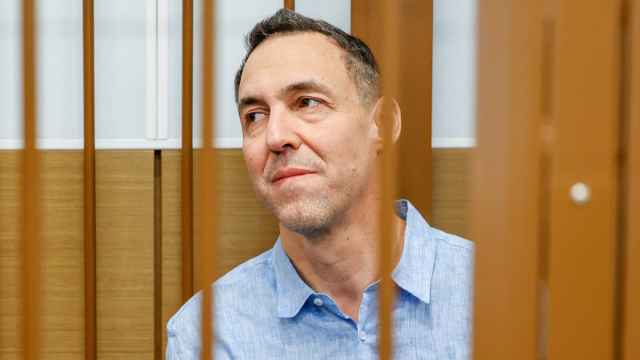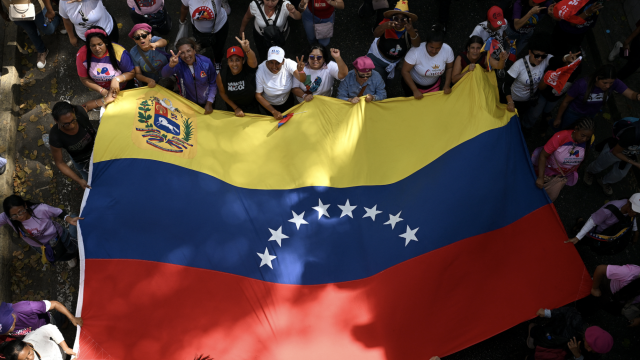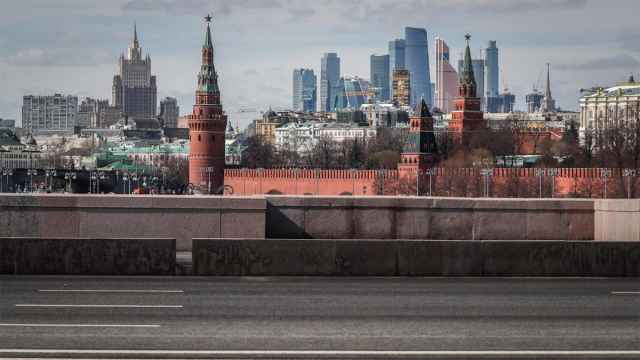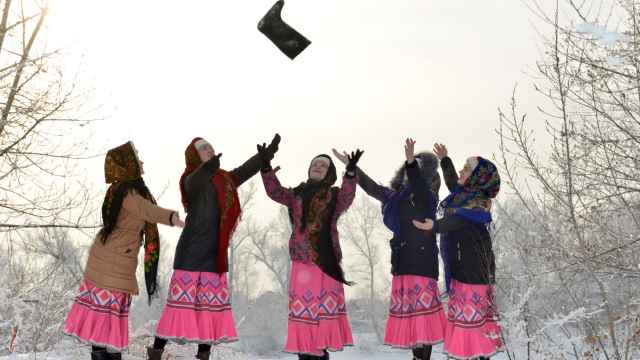U.S. Ambassador John Beyrle has condemned the release of classified diplomatic cables as criminal, but he is adamant that the coup from the WikiLeaks whistle-blowing web site won't affect his work or the "reset" in U.S.-Russian relations.
"This was a crime. Confidential information was stolen from the U.S. government and then published," Beyrle said Tuesday.
He added that the administration has taken measures that "nothing like this can happen again" and was pursuing legal options.
Beyrle was speaking in an interview with The Moscow Times in the U.S. Embassy, just hours before WikiLeaks founder Julian Assange was arrested in London on a Swedish warrant on sex charges.
The ambassador played down any worries that the publication of candid correspondence between U.S. missions and Washington might undermine the work of diplomats, saying diplomacy had not changed much over the past 200 years and would not do so in the future.
"Diplomats are like special correspondents. … Our job is to try to understand what's happening in the country we're accredited to and describe that back to Washington in a way that helps Washington make good solid policy judgments," he said, adding that this sometimes required to "put our own assessments on the table."
Beyrle also said he "really regrets" that some of the revelations put people at risk, but that this was not the case in Russia.
On a more upbeat note, the ambassador said the leaks might throw some positive light on his work. "In some ways it helps people to have a better appreciation of what it is that diplomats and especially American diplomats do," he said.
The 57 cables from the Moscow embassy released so far contain some potentially embarrassing language, like an argument that President Dmitry Medvedev continues to play "Robin" to Prime Minister Vladimir Putin's "Batman" and that first lady Svetlana Medvedeva has created tension inside the government.
Beyrle refused to discuss the contents of any of cables. Instead, he praised the Russian government's reaction to the leaks. "We have been heartened by the official reaction we've heard from our Russian colleagues. I think Foreign Minister [Sergei] Lavrov said it best: 'Form conclusions based on actions, not based on words.'"
He said it was important to look forward and continue the "reset" in relations with Moscow initiated by the administration of President Barack Obama.
"If you look at the results that we've accomplished over the last two years in U.S.-Russian relations, they are quite significant and quite positive," he said.
The ambassador was adamant that Obama's hopes that the Senate ratify the New START nuclear arms treaty before the end of the year are justified — even though Republicans have stepped up their opposition.
Last month's midterm elections will reduce the Democrats' majority in the 100-seat Senate from 57 to 51 in January. The treaty must be ratified with at least 67 votes.
Beyrle "very strongly" rejected any notion that Obama was a "lame duck" president, saying his administration was lobbying Congress in dozens of hearings and briefings.
"We continue to talk to senators about their specific concerns to answer their questions to make sure that the vote will be taken on the basis of full information, full transparency," he said.
The reset with Moscow, he said, must continue because it "produces results."
"Historically, these kinds of arms control treaties have always passed with strong bipartisan majorities," he said. "And we're confident at the end of the day that we will have a very strong vote this year in favor of ratification of the START treaty in the Senate."
He said that while in 2009 efforts focused on "restoring trust and improving the tone in relations," 2010 had shown results: signing
START, cooperation in Afghanistan, and "very, very close coordination" over Iran and North Korea.
Washington is building a missile defense shield to protect the United States and its allies from nuclear weapons programs that it says are pursued by Tehran and Pyongyang.
At a NATO summit in Lisbon last month, Medvedev agreed to study plans to cooperate on a revamped missile defense plan that would be NATO's responsibility.
Beyrle said the Lisbon summit was "a breakthrough" for NATO-Russia relations because it adopted the Western alliance's new strategy that no longer views Moscow as an adversary.
He conceded that "there are a lot of unanswered questions about exactly what form Russia's contribution to missile defense will be," but said that he won't "prejudge any of the discussions that we are going to have."
"We are open to make sure that Russia's contribution is meaningful, relevant and adds to the shield of security that we are looking to build," he said.
Beyrle also said a new agreement regulating child adoptions with Russia was in the final stages and would be completed either this year or early next year.
"We are getting very, very close to an agreement. As you get close to the end there are always words and phrases that you're trying to get just right on both sides," he said.
The Kremlin demanded a treaty on adoptions after a U.S. woman in April sent her 7-year-old adopted son back to Russia unaccompanied on a plane with a note describing him as psychologically troubled.
The State Department had said both sides would complete the agreement at a fifth round of talks last week.
Beyrle said he had no doubt that the treaty would be wrapped up — "if not by the end of this year then very early in the new year" because "both sides are very interested in seeing this happen."
Medvedev has called for an agreement establishing the responsibilities of U.S. parents adopting children from Russia and creating a system to monitor the children's well-being.
More than 60,000 Russian children have been adopted by foreigners, mostly Americans, since the Soviet breakup in 1991, and Russia was the third-largest source of foreign adoptions to the United States in 2009, with 1,586 adoptions, according to State Department figures.
Beyrle said that while adoptions are ongoing, the new agreement will ensure that both families putting children up for adoption and families wishing to adopt will "go through a better vetting process than in the past."
A Message from The Moscow Times:
Dear readers,
We are facing unprecedented challenges. Russia's Prosecutor General's Office has designated The Moscow Times as an "undesirable" organization, criminalizing our work and putting our staff at risk of prosecution. This follows our earlier unjust labeling as a "foreign agent."
These actions are direct attempts to silence independent journalism in Russia. The authorities claim our work "discredits the decisions of the Russian leadership." We see things differently: we strive to provide accurate, unbiased reporting on Russia.
We, the journalists of The Moscow Times, refuse to be silenced. But to continue our work, we need your help.
Your support, no matter how small, makes a world of difference. If you can, please support us monthly starting from just $2. It's quick to set up, and every contribution makes a significant impact.
By supporting The Moscow Times, you're defending open, independent journalism in the face of repression. Thank you for standing with us.
Remind me later.



